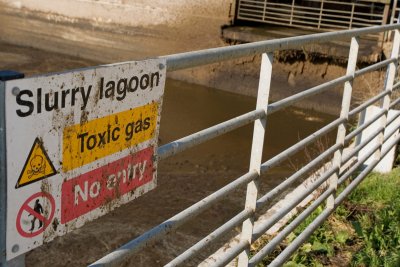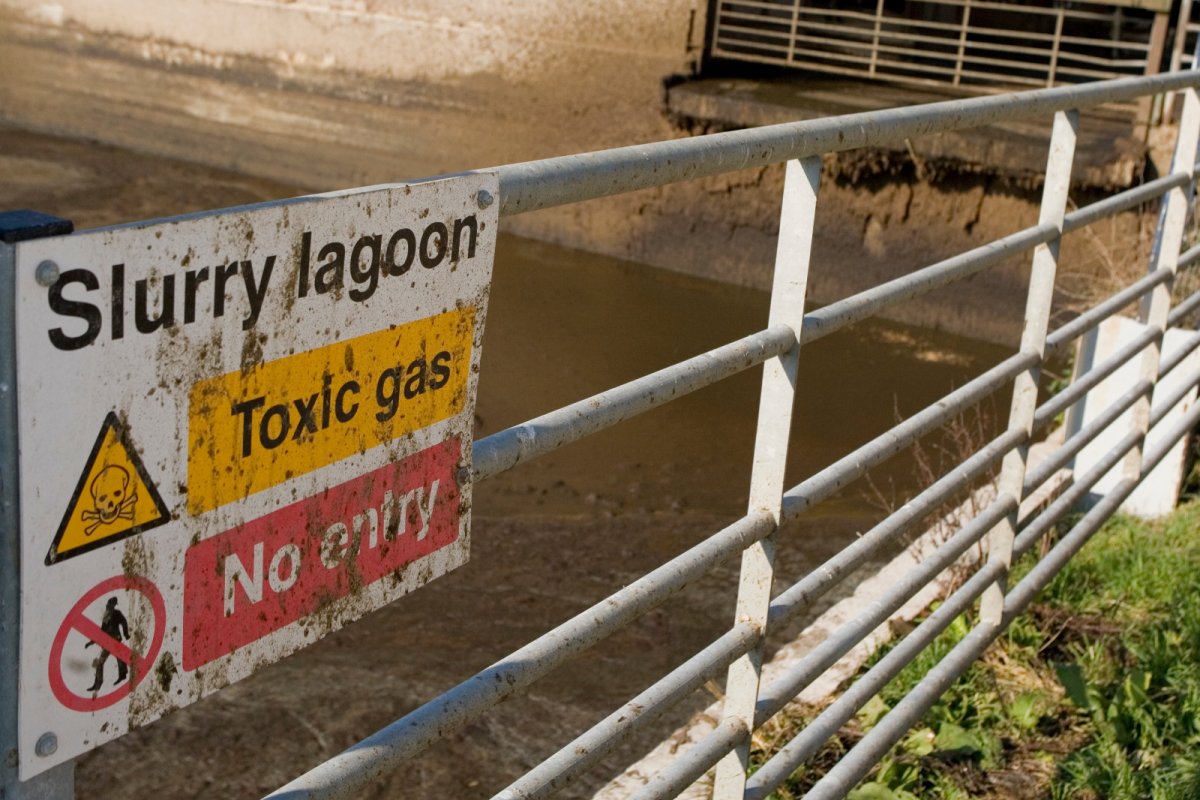 Slurry Lagoon sign at a dairy farm. Copyright: chrisbrignell | shutterstock
Slurry Lagoon sign at a dairy farm. Copyright: chrisbrignell | shutterstock
-
Industrial livestock farming in the UK produces more than 50,000 tonnes of untreated excreta each day, the equivalent of well over 100 Double-decker buses per hour.
-
Industrial farms along the Wye Valley alone produce over 2,500 tonnes of untreated excreta every day.
-
Every region in the UK now has more nitrogen than it can absorb; regions of England with high concentrations of industrialised indoor-reared livestock have the biggest nitrogen surplus.
Every hour, industrially reared chickens, pigs and dairy cows generate the equivalent of well over 100 double decker buses of toxic poo, or 50,000 tonnes a day.
This waste contains a toxic cocktail of pollutants, including nitrates, phosphates, and antibiotic resistant bacteria. The volume is more than can be absorbed by the soil so it spills into rivers, causing algal blooms that choke wildlife. Every region in the UK is now in ‘nitrogen surplus’.
More than 40% of total nitrogen pollution comes from livestock manure and regions of England with high concentrations of industrialised indoor-reared livestock have the biggest nitrogen surplus. For example, industrial farms along the Wye Valley (Herefordshire, Powys, Monmouthshire, Gloucestershire) alone produce 2,500 tonnes of manure every day. This toxic animal waste in turn produces 13,038 tonnes of nitrogen and 4,443 tonnes of phosphates every day.
In 42 areas in the UK, nitrogen pollution is so acute that councils are unable to approve any housing developments that may add more nitrogen to the environment; an extreme measure to prevent further harm to sensitive habitats. However, in many places, industrial livestock units are still receiving planning approval and being built.
Sustain is calling on councils to introduce local planning regulations to require all livestock developments to prove that they are contributing to reversing, rather than exacerbating, pollution and biodiversity decline, and to tackle the climate emergency. The campaign is also demanding that national government reforms planning policy to put climate change, nature and biodiversity decline at the heart of considerations for all applications. This would mean the most polluting industries would be required to disclose the harm they cause at planning stage, and be rejected where there is clear evidence of damage.
Ruth Westcott, Climate and Nature Emergency Coordinator at Sustain said
"Our rivers are on the brink of ecological collapse. People are waking up to the fact that rivers are the life blood of our country, and a cornerstone of our economy, but we can’t forget that the big industrial livestock farms are a big factor in this disaster. Local councils have power. They can show they are serious about cleaning up our rivers by adopting planning policy to support nature-friendly farming rather than more intensive livestock units."
Dr Nick Palmer, Head of Compassion in World Farming UK, said
"The new analysis by Sustain highlights the alarming impact of excreta from industrial farms across the UK. On many of these farms, animals are also caged and confined in ways that inflict appalling suffering. We need a ‘less and better’ approach which protects the environment and animal welfare. Local authorities can change the future for our society by drawing up planning guidance to encourage a more sustainable, agroecological approach without factory farming”.
Areas in England with high concentrations of industrially reared livestock are experiencing the greatest nitrogen pollution
| Area | Number of animals (millions) | Volume of toxic animal waste per day (tonnes) |
|---|---|---|
| Herefordshire | 16.80 | 1 545 |
| Nottinghamshire | 2.70 | 237 |
| Lincolnshire | 12.00 | 1 341 |
| Suffolk | 5.75 | 1 300 |
| North Yorkshire | 7.25 | 2 000 |
| Devon | 2.45 | 481 |
| Somerset | 4.35 | 743 |
| Shropshire | 14.70 | 1 550 |
For the purposes of these calculations:
- ‘Intensive livestock’ is assumed to be any chickens and pigs apart from organic-certified animals, and 20% of all dairy cows in the UK
- Livestock excreta volumes were taken from government data
- UK-wide livestock figures were drawn from recent government estimates
- Regional livestock figures were drawn from a 2017 survey pulled together by Compassion in World Farming
- Data on soil nutrient balances from regional and UK-wide government data
- To estimate excreta per day per farmed animal, we calculated an average figure for excreta per day over an animal's lifetime. To produce regional excreta figures, we multiplied average excreta per day per farmed animal with regional factory farm population data drawn from Compassion in World Farming data from 2017. To produce national excreta figures, we estimated national factory farm livestock populations from UK-wide livestock data and then multiplied this with average excreta per day per farmed animal.
Save our rivers
Over 100 busloads of toxic poo are produced by factory farms in the UK every hour. With our soils saturated, this ends up washing into our rivers, suffocating wildlife.
Food for the Planet: Food for the Planet is helping local authorities, businesses and organisations take simple actions to tackle the climate and nature emergency through food.
